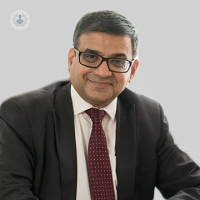Colorectal cancer - who is at risk?
Written by:Non-cancerous polyps that develop in the colon can be found through colorectal cancer screening and removed before they become cancerous. If colorectal cancer occurs, early detection and treatment dramatically increase chances of survival. The relative five-year survival rate for colorectal cancer, when diagnosed at an early stage is 90% opposed to an only 65% survival rate when diagnosed after the cancer has spread to involve nearby organs or lymph nodes.

The importance of screening for colorectal cancer
The goal of screening for colorectal cancer is to find polyps and cancers before they cause symptoms. These tests provide the best opportunity to detect the cancer at an early stage, when successful treatment is likely and to prevent some cancers by detection and removal of polyps. There are several tests used to screen for colorectal cancer and different options for those with an average risk.
Read more: testing for colon cancer
Risk factors of colorectal cancer
Researchers have identified several risk factors that increase a patient’s chance of developing colorectal cancer, such as:
- A family history of colorectal cancer - the majority of cancers happen to people who have no family history.
- A personal history of intestinal polyps.
- A personal history of chronic inflammatory bowel disease.
- Age over 50 - Your chances of developing colorectal cancer increase markedly after age 50. About 90% of people found to have colorectal cancer are older than 50.
- A diet mostly from animal sources - a diet mostly of foods that are high in fat, especially from animal sources, can increase your risk of colorectal cancer. It is recommended that we eat at least 5 servings of fruits and vegetables every day and several servings of other foods from plant sources such as breads, cereals, grain products, rice, pasta, or beans. Many fruits and vegetables contain substances that interfere with the process of cancer formation.
- Physical inactivity - if you are not physically active, you have an increased risk of developing colorectal cancer.
- Obesity - if you are very overweight, your risk of developing colorectal cancer is increased. This is particularly true if you are fatter in your waist area than in your thighs or hips. Researchers suggest that the excess fat changes metabolism in a way that increases growth of cells in the colon and rectum, and that fat cells in the waist area have the largest impact on metabolism.
- Diabetes - people with diabetes have a 30% to 40% increased chance of developing colon cancer. They also tend to have a higher death rate after diagnosis.
- Smoking - recent studies indicate that smokers are 30% to 40% more likely than non-smokers to die from colorectal cancer. Smoking may be responsible for causing about 12% of fatal colorectal cancers. Most people know that smoking causes cancers in sites in the body that come in direct contact with the smoke, such as the mouth, larynx, and lungs.
- Alcohol intake - colorectal cancer has been linked to the heavy use of alcohol. While some of this may be due to the effects of alcohol on folic acid in the body, it still would be wise to avoid heavy alcohol use.
Prevention of colorectal cancer
Screening at the age of 50 is recommended even if there are no symptoms. Some colorectal cancers can also be found early if people report any symptoms (such as a change in bowel habits, rectal bleeding and blood in the stool) right away to their doctors. Other conditions such as infections, haemorrhoids, and inflammatory bowel disease can also cause these symptoms.
Only a doctor can determine the cause of the same symptoms. It is important that a patient talks to their doctor since finding colorectal cancer early makes successful treatment more likely. It is also possible to have colon cancer and not have any symptoms. If the doctor suspects colon cancer, more tests will need to be done.
Not only does colorectal cancer screening save lives, but it also reduces health care costs.


